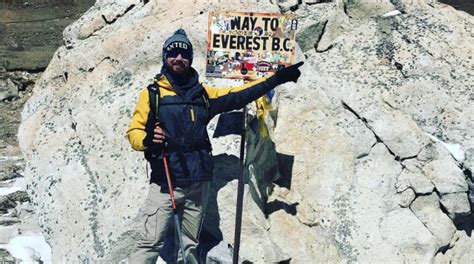Everest: A Journey of Self-Discovery and Difficulty
Mount Everest. The name itself conjures images of breathtaking beauty, daunting challenges, and the ultimate test of human endurance. For many, it represents the pinnacle of mountaineering achievement, a symbol of ambition and the relentless pursuit of a seemingly impossible goal. But beyond the stunning vistas and the thrill of conquering the world's highest peak lies a profoundly personal journey of self-discovery, fraught with difficulties both physical and psychological. This article will delve into the multifaceted experience of climbing Everest, exploring the arduous physical demands, the mental fortitude required, and the transformative impact it can have on the climber's self-perception.
The Grueling Physical Demands of Everest
Conquering Everest is not simply a matter of physical strength; it's a brutal test of stamina, resilience, and adaptability. The extreme altitude presents a formidable challenge. The air at the summit is only one-third as dense as at sea level, leading to altitude sickness, characterized by symptoms ranging from headaches and nausea to potentially life-threatening pulmonary or cerebral edema. Climbers must acclimatize gradually, spending weeks at progressively higher altitudes to allow their bodies to adjust.
How long does it take to climb Mount Everest?
The timeframe for climbing Everest varies depending on the route and the climber's experience, but generally involves several weeks to months. Acclimatization periods, the journey to base camp, and the multiple rotations to higher camps extend the overall expedition timeline.
What are the physical challenges of climbing Everest?
Beyond altitude sickness, climbers face extreme cold, high winds, and the ever-present danger of falling ice and snow. The sheer physical exertion of climbing steep slopes, hauling heavy equipment, and navigating treacherous terrain puts immense strain on the body. Exhaustion, frostbite, and hypothermia are constant threats, demanding unwavering vigilance and resilience.
The Mental Fortitude Required: More Than Just Muscles
The physical challenges of Everest are only half the battle. The mental demands are equally, if not more, crucial. Climbers face intense periods of isolation, boredom, and discomfort. They must maintain their focus and determination in the face of adversity, pushing through exhaustion and fear. Decision-making under pressure is paramount, as a single mistake can have life-altering consequences.
What mental challenges do Everest climbers face?
The mental strain of Everest is multifaceted. It includes dealing with the fear of heights, the constant awareness of risk, and the pressure of being part of a team reliant on each other’s safety. Loneliness, even within a team, is common at higher altitudes where communication becomes more difficult. Doubt and despair can easily creep in, testing the climber's psychological resilience.
The Transformative Journey of Self-Discovery
Despite the inherent difficulties, climbing Everest offers an unparalleled opportunity for self-discovery. The experience pushes climbers to their absolute limits, revealing their strengths and weaknesses in ways they may never have imagined. The challenges faced often lead to profound personal growth, a deeper understanding of their capabilities, and a renewed sense of self-worth.
How does climbing Everest change a person?
Many climbers describe the experience as life-altering. The journey forces them to confront their fears, embrace vulnerability, and discover an inner strength they never knew they possessed. It fosters resilience, resourcefulness, and a greater appreciation for the power of the human spirit. The sense of accomplishment upon reaching the summit is often described as deeply profound and transformative, leaving a lasting impact on their perspectives and priorities in life.
Conclusion: A Peak Experience
Climbing Everest is a grueling, demanding, and potentially dangerous undertaking. It requires immense physical strength, unwavering mental fortitude, and meticulous preparation. However, it is also a journey of profound self-discovery, a testament to human resilience, and an unforgettable experience that leaves climbers forever changed. The challenges, both physical and mental, are immense, but the rewards – the personal growth, the breathtaking views, and the unparalleled sense of achievement – are equally extraordinary. It is a peak experience in every sense of the word.

